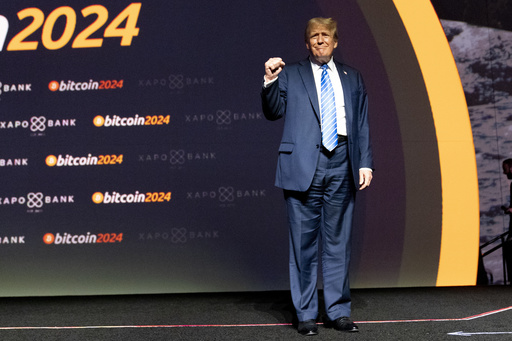NEW YORK — Following Donald Trump’s recent election victory, there has been a notable influx of funds into the cryptocurrency market, leading to a surge in bitcoin’s value.
On Monday, bitcoin hit a remarkable milestone of over $87,000 for the first time. By approximately 3:45 PM ET, the cryptocurrency was priced at $87,083, which marks an impressive increase of over 28% in just the past week. This upswing is part of a broader rally affecting not only bitcoin but other cryptocurrencies and related investments since Trump’s election win. Analysts attribute the recent price increases to the expected “crypto-friendly” policies of the forthcoming administration, which may offer greater regulatory clarity and a more lenient stance towards the sector.
However, the unpredictable nature of cryptocurrencies means that the future remains uncertain. While some investors are optimistic about continued growth, others are cautioning about the investment risks involved.
To clarify, cryptocurrency refers to digital currencies that function over an online network without reliance on a central authority, making them typically unbacked by any governmental or banking systems. Moreover, transactions are recorded on a technology known as blockchain. Bitcoin stands as the largest and oldest cryptocurrency, but alternatives such as Ethereum, Tether, and Dogecoin have also gained traction in recent years. Many view cryptocurrency as a “digital replacement” for conventional money, though its volatility is a significant risk factor depending on broader market conditions.
The current surge in bitcoin and other crypto assets is largely influenced by the results of last week’s election. Trump, who once expressed skepticism towards cryptocurrencies, has shifted his perspective and now advocates for their use. He has promised to turn the U.S. into “the crypto capital of the planet” and plans to establish a “strategic reserve” of bitcoin. During his campaign, he accepted cryptocurrency donations and engaged with supporters at a bitcoin conference. Additionally, Trump launched World Liberty Financial, a new family venture targeting cryptocurrency trading.
Industry players in the crypto realm greeted Trump’s election with optimism, hoping he would advance the regulatory changes they have sought for a long time. Trump had previously assured that he would remove Gary Gensler, currently chairing the Securities and Exchange Commission and spearheading the government’s stringent measures on the crypto market.
“Crypto experienced a rally as Election Day unfolded and it became clearer that Trump would be the winner,” wrote Citi analysts David Glass and Alex Saunders in a recent research note. They referenced broader sentiment within the industry regarding Trump’s perceived support for cryptocurrencies and the potential for a shift in regulatory attitudes.
Before the election-driven price surge, bitcoin had already shown substantial growth over the year, driven primarily by the early success of spot bitcoin exchange-traded funds (ETFs) approved by U.S. regulators in January. According to Glass and Saunders, these ETFs have been a key factor behind the rising returns on bitcoin, with record inflows occurring soon after the election.
However, it’s important to recognize the risks involved in investing in crypto assets like bitcoin, which are notorious for their rapid and unpredictable price fluctuations. Investors can lose money as quickly as they can earn it, and historical trends indicate that long-term pricing is heavily influenced by larger economic conditions.
In early 2020, bitcoin was valued just above $5,000 but soared to nearly $69,000 by November 2021 thanks to high demand for technology assets. This gain was followed by a price crash due to a series of Federal Reserve rate hikes intended to combat inflation and the subsequent collapse of the FTX platform, which lowered confidence in the crypto industry. At the beginning of last year, bitcoin priced below $17,000 witnessed a resurgence fueled by declining inflation rates and the success of spot ETFs. Despite the enthusiasm surrounding the market, experts advise caution, particularly for investors with limited resources.
“Investors should engage with cryptocurrencies using funds they can afford to lose,” said Susannah Streeter from Hargreaves Lansdown last week, highlighting the volatility of the market.
Cryptocurrency mining processes, particularly those involving bitcoin, are also under scrutiny for their environmental impact. This activity is highly energy-intensive, raising concerns over its reliance on non-renewable energy sources.
Research by the United Nations University and Earth’s Future journal found that bitcoin mining from 2020 to 2021 across 76 countries generated emissions equivalent to burning 84 billion pounds of coal or operating 190 natural gas power plants. In the U.S., the Energy Information Administration (EIA) reported that crypto mining has grown rapidly, creating electricity demand concerns among grid planners. Preliminary EIA estimates indicate that annual electricity usage from crypto mining could account for between 0.6% and 2.3% of the nation’s total electricity consumption.
The environmental consequences of bitcoin mining largely depend on the sources of energy utilized. Analysts in the industry have noted a rising trend towards using cleaner energy in recent years, coinciding with increasing calls for environmental protections worldwide.



